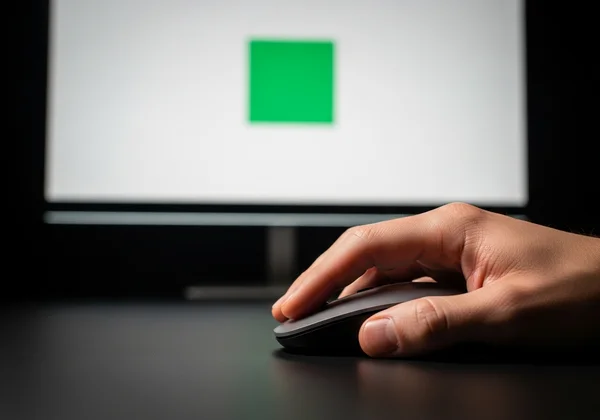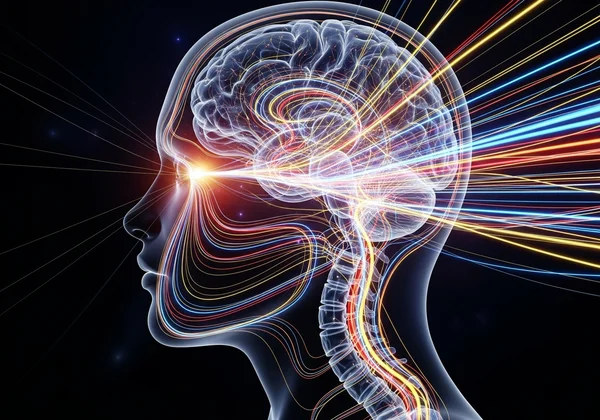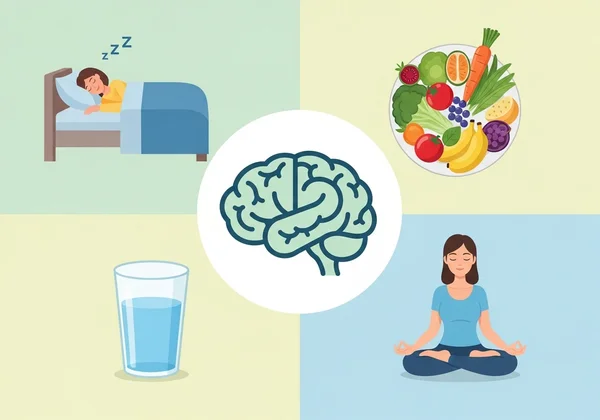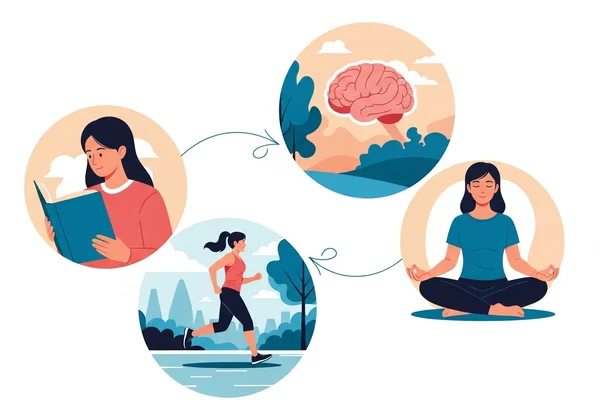زمان واکنش و سلامت ذهن: نمرهی شما چه چیزی را آشکار میکند
October 30, 2025 | By Marcus Adler
با افزایش سن، کنجکاوی در مورد سلامت ذهنمان طبیعی است. ما تعجب میکنیم که آیا ذهنمان به همان تیزی گذشته است یا خیر و به دنبال راههایی هستیم تا آن را حفظ کنیم. اما اگر یکی از شاخصهای کلیدی عملکرد مغز شما به اندازهی یک کلیک ساده باشد چه؟ زمان واکنش شما، که اغلب تنها معیاری برای گیمرها تلقی میشود، اطلاعات جالبی در مورد سرعت پردازش و عملکرد کلی مغز شما ارائه میدهد. یک تست سادهی زمان واکنش میتواند دریچهای قدرتمند به سلامت عصبی شما باشد. اما چه چیزی باعث کندی زمان واکنش میشود و چه کاری میتوانید در مورد آن انجام دهید؟
این راهنما ارتباط عمیق بین سرعت واکنش و سلامت مغز شما را میکاود. معنای نمرهی شما را رمزگشایی خواهیم کرد، عواملی که بر آن تأثیر میگذارند را بررسی میکنیم و استراتژیهای عملی برای تیز نگه داشتن ذهن شما ارائه میدهیم. آمادهاید تا ببینید رفلکسهایتان چه چیزی را آشکار میکنند؟ میتوانید همین حالا با ابزار آنلاین سادهی ما یک نمرهی پایه دریافت کنید.

رمزگشایی زمان واکنش سلامت مغز شما: اصول اولیه
قبل از اینکه به نحوهی ارتباط زمان واکنش با پیری شناختی بپردازیم، ضروری است آنچه را که واقعاً اندازهگیری میکنیم درک کنیم. این فقط به معنای انگشتان سریع نیست، بلکه بازتاب مستقیمی از کارایی سیستم عصبی شماست.
زمان واکنش دقیقاً چیست؟ واکنشهای ساده در مقابل واکنشهای انتخابی
در اصل، زمان واکنش، بازهی زمانی بین درک یک محرک و آغاز یک پاسخ است. تست در وبسایت ما یک زمان واکنش ساده را اندازهگیری میکند: شما یک محرک (تغییر رنگ) را میبینید و یک عمل (یک کلیک) را انجام میدهید. این سرعت پایهی مسیرهای عصبی شما را اندازهگیری میکند.
با این حال، زندگی اغلب پیچیدهتر است و شامل واکنشهای انتخابی میشود. در این حالت، شما چندین محرک دارید و باید پاسخ صحیح را انتخاب کنید، مانند زدن پدال ترمز به جای پدال گاز. این نوع واکنش شامل پردازش شناختی بالاتر، از جمله تصمیمگیری است، و همچنین یک جزء کلیدی از هوشیاری شناختی کلی است.
مسیرهای عصبی: از محرک تا پاسخ
هنگامی که جعبهی تست سبز میشود، زنجیرهای جذاب از رویدادها در بدن شما رخ میدهد. چشمان شما (گیرندههای حسی) سیگنالی را از راه عصب بینایی به لوب پسسری مغز شما میفرستند. مغز شما این اطلاعات را پردازش میکند، آن را سیگنال "برو" تشخیص میدهد، و یک فرمان را از طریق قشر حرکتی به پایین نخاع شما به ماهیچههای دست و انگشتان شما میفرستد.
این سفر کامل، از محرک تا پاسخ، در میلیثانیه انجام میشود. زمان نهایی نمایش داده شده، معیاری از کارایی کلی کل این مسیر عصبی است. زمان سریعتر نشاندهندهی یک سیستم خوب و کارآمد است، در حالی که زمان کندتر ممکن است نشاندهندهی یک گلوگاه در جایی از آن مسیر پیچیده باشد.

سرعت واکنش و سن: درک تغییرات شناختی
یکی از رایجترین سوالاتی که با آن روبرو میشویم این است که چگونه سن بر زمان واکنش تأثیر میگذارد. در حالی که درست است که رفلکسها میتوانند به طور طبیعی در طول سالها کند شوند، میزان و سرعت این تغییر میتواند از فردی به فرد دیگر به طور چشمگیری متفاوت باشد. درک این رابطه اولین گام برای داشتن مغزی سالم و فعال است.
محدودههای معمول زمان واکنش بر اساس گروه سنی
در حالی که نتایج فردی میتواند بر اساس عوامل زیادی متفاوت باشد، تحقیقات روند کلی میانگین زمان واکنش را در گروههای سنی مختلف نشان میدهد. بزرگسالان جوان در سنین 20 سالگی اغلب سریعترین امتیازات را دارند که معمولاً بین 150 تا 250 میلیثانیه (ms) متغیر است.
با رسیدن به سنین 30، 40 سالگی و بالاتر، این میانگین ممکن است به تدریج چند میلیثانیه در هر دهه افزایش یابد. با این حال، یک سبک زندگی سالم میتواند این روند کاهشی را به طور قابل توجهی کند کند. مهم این نیست که به دنبال امتیاز یک فرد 20 ساله باشید، بلکه این است که خط پایه شخصی خود را تعیین کرده و آن را برای تغییرات قابل توجه در طول زمان نظارت کنید. یک تست رفلکس سریع میتواند به شما کمک کند تا نقطهی شروع فعلی خود را پیدا کنید.
چرا زمان واکنش با افزایش سن تمایل به کند شدن دارد؟
کاهش تدریجی زمان واکنش با افزایش سن یک فرآیند طبیعی است که با تغییرات در مغز و سیستم عصبی همراه است. غلافهای میلین که فیبرهای عصبی ما را عایقبندی میکنند و باعث میشوند سیگنالها به سرعت حرکت کنند، میتوانند با گذشت زمان تخریب شوند. علاوه بر این، تعداد نورونها و چگالی اتصالات سیناپسی میتواند کم شود.
این به معنای زوال شناختی قابل توجه نیست. آن را مانند قدرت عضلانی در نظر بگیرید؛ بدون ورزش منظم، به طور طبیعی ضعیف میشود. به همین ترتیب، بدون فعالیت ذهنی و سبک زندگی سالم، سرعت پردازش عصبی ما میتواند کند شود. خبر خوب این است که، درست مانند عضلات، مغز را میتوان آموزش داد و نگهداری کرد.
فراتر از سن: سایر علل کندی زمان واکنش
در حالی که سن یک عامل مهم است، اما تنها عامل مؤثر نیست. بسیاری از عوامل روزمره میتوانند بر نمرهی شما در یک تست عملکرد شناختی تأثیر بگذارند. شناخت این تأثیرات بسیار مهم است زیرا بسیاری از آنها قابل کنترل توسط شما هستند.
عوامل سبک زندگی: خواب، تغذیه و هیدراتاسیون
عملکرد مغز شما مستقیماً با سلامت جسمانی شما وابسته است. کمبود خواب با کیفیت یکی از بزرگترین عوامل اصلی کندتر شدن واکنشها است، زیرا توجه و پردازش شناختی را دچار اختلال میکند. کم آبی همچنین میتواند عملکرد مغز را کند کند، در حالی که رژیم غذایی با کمبود مواد مغذی ضروری مانند اسیدهای چرب امگا 3 و آنتیاکسیدانها میتواند بر سلامت طولانی مدت مغز تأثیر بگذارد. این عوامل سبک زندگی بنیادی برای حفظ رفلکسهای تیز هستند.

استرس، خستگی و کمبود توجه
حالت ذهنی نقش بسیار مهمی دارد. سطوح بالای استرس و خستگی ذهنی میتوانند منابع شناختی را منحرف کنند و منابع کمتری را برای کارهای سریع محرک-پاسخ در دسترس قرار دهند. وقتی تحت استرس یا خسته هستید، توجه شما تقسیم میشود و تمرکز بر کار و پاسخگویی سریع را دشوارتر میکند. این دلیل نوسان نمره از روزی به روز دیگر است.
چه زمانی باید نگران بود: زمان واکنش به عنوان یک شاخص (نه یک تشخیص)
درک این نکته حیاتی است که یک تست آنلاین زمان واکنش ابزاری به منظور خودآگاهی است، نه یک ابزار تشخیصی. کاهش مداوم زمان واکنش، به ویژه اگر با سایر مشکلات شناختی مانند مشکلات حافظه همراه باشد، باید با یک پزشک متخصص در میان گذاشته شود. با این حال، یک نمرهی کند گاه به گاه معمولاً فقط بازتاب خستگی یا یک حواسپرتی لحظهای است. از این ابزار برای پیگیری روندها استفاده کنید، نه برای خودتشخیصی.
چگونه سرعت پردازش مغز را بهبود بخشیم و هوشیاری شناختی را حفظ کنیم
زمان واکنش شما غیر قابل تغییر نیست. با اتخاذ عادات مفید برای سلامت مغز، میتوانید به طور فعال برای حفظ و حتی بهبود سرعت پردازش شناختی خود در هر سنی تلاش کنید. هدف، ایجاد محیطی است که مغز شما بتواند در آن رشد کند.

تحریک ذهنی و فعالیتهای تمرین مغز
همانطور که ورزش بدنی عضلات را تقویت میکند، ورزش ذهنی نیز اتصالات عصبی را مستحکم میسازد. پرداختن به فعالیتهای جدید و چالشبرانگیز—مانند یادگیری یک زبان جدید، نواختن یک آلت موسیقی، یا حل پازلهای پیچیده—ذخیرهی شناختی را ایجاد میکند. استفادهی منظم از یک ابزار تمرین زمان واکنش میتواند راهی سرگرمکننده و متمرکز برای هدفگیری و بهبود خاص سرعت پردازش مغز شما باشد.
قدرت فعالیت بدنی برای سلامت ذهن
ورزش یکی از قدرتمندترین ابزارها برای بهبود عملکرد مغز است. فعالیتهای هوازی مانند پیادهروی سریع، شنا یا دوچرخهسواری، جریان خون به مغز را افزایش داده و اکسیژن و مواد مغذی حیاتی را تأمین میکنند. همچنین نشان داده شده است که ورزش باعث تحریک نوروژنز (ایجاد نورونهای جدید) میشود، به ویژه در هیپوکامپ، ناحیهای که برای حافظه و یادگیری حیاتی است.
تکنیکهای ذهنآگاهی و کاهش استرس
مدیریت استرس کلید دستیابی به اوج عملکرد مغز شماست. تمرینهایی مانند مدیتیشن ذهنآگاهی میتوانند با تربیت مغزتان برای ماندن در لحظهی حال، تمرکز و توجه را بهبود بخشند. با کاهش بار شناختی ناشی از استرس مزمن، شما پهنای باند ذهنی را آزاد میکنید، که امکان پردازش سریعتر و کارآمدتر اطلاعات را فراهم میآورد.
سفر شما به سوی واکنشهای تیزتر و سلامت مغز بهتر از اینجا آغاز میشود
زمان واکنش شما بیش از یک عدد است. این یک معیار پویا و بصیرتبخش از سلامت عصبی شماست. این معیار بازتابدهندهی رقص پیچیدهی بین حواس، مغز و بدن شماست. با درک عواملی که بر آن تأثیر میگذارند—از سن و خواب گرفته تا استرس و ورزش—شما کنترل سلامت ذهن خود را به دست میگیرید.
پیگیری نمرهی شما در طول زمان، دادههای شخصی ارزشمندی را ارائه میدهد و به شما کمک میکند تا تأثیر تغییرات سبک زندگی بر تیزی ذهنی خود را مشاهده کنید. این یک مفهوم انتزاعی مانند "سلامت مغز" را به یک اندازهگیری ملموس و قابل پیگیری تبدیل میکند. سفر به ذهنی تیزتر با یک کلیک آغاز میشود.
چرا همین امروز شروع نکنید؟ تست رایگان زمان واکنش را در صفحهی اصلی ما انجام دهید تا خط پایه خود را تعیین کنید. آن را به یک عادت همیشگی تبدیل کنید و ببینید چگونه انتخابهای سبک زندگی شما در نمرهی شما منعکس میشود.
پرسشهای متداول در مورد زمان واکنش و سلامت مغز
زمان واکنش خوب برای گروه سنی من چه زمانی است؟
یک زمان واکنش "خوب" نسبی است، اما برای بزرگسالان جوان، نمرات بین 150 تا 250 میلیثانیه رایج هستند. این میانگین با هر دهه کمی افزایش مییابد. مهمتر از همه این نیست که خود را با دیگران مقایسه کنید، بلکه باید خط پایه شخصی خود را با تست زمان واکنش انسان تعیین کرده و آن را برای ثبات و بهبود شخصی ردیابی کنید.
آیا کاهش مداوم زمان واکنش میتواند نشانهی اولیهی زوال شناختی باشد؟
در حالی که کاهش ناگهانی و قابل توجه در زمان واکنش میتواند نشانهای از مشکلات بهداشتی زمینهای باشد، اما تشخیص محسوب نمیشود. بسیاری از عوامل قابل کنترل، مانند خستگی یا استرس، باعث کاهش موقتی میشوند. اگر نگران کاهش مداوم در نمرات همراه با علائم دیگر هستید، همیشه بهتر است برای ارزیابی مناسب با یک پزشک متخصص مشورت کنید.
آیا واقعاً میتوان زمان واکنش خود را به طور قابل توجهی در بزرگسالی بهبود داد؟
کاملاً. مغز توانایی چشمگیری برای سازگاری و تغییر دارد که به آن انعطافپذیری عصبی میگویند. از طریق تمرین مداوم با ابزارهایی مانند تست سرعت واکنش، پرداختن به فعالیتهای تحریککنندهی ذهنی، ورزش بدنی منظم و مدیریت استرس، اکثر بزرگسالان میتوانند بهبودهای قابل اندازهگیری در نمرات خود و سرعت پردازش کلی را مشاهده کنند.
هر چند وقت یکبار باید زمان واکنش خود را آزمایش کنم تا سلامت مغزم را به طور مؤثر پیگیری کنم؟
برای پیگیری مؤثر، ثبات کلیدی است. توصیه میکنیم زمان واکنش خود را چند بار در هفته، ترجیحاً در همان زمان از روز، آزمایش کنید تا یک میانگین پایدار ثبت کنید. این به شما امکان میدهد تا روندها را پیگیری کرده و ببینید چگونه عواملی مانند یک خواب شبانهی خوب یا یک هفتهی پر استرس بر عملکرد شما تأثیر میگذارد. میتوانید تست کلیک را در هر زمان انجام دهید تا پیشرفت خود را پیگیری کنید.